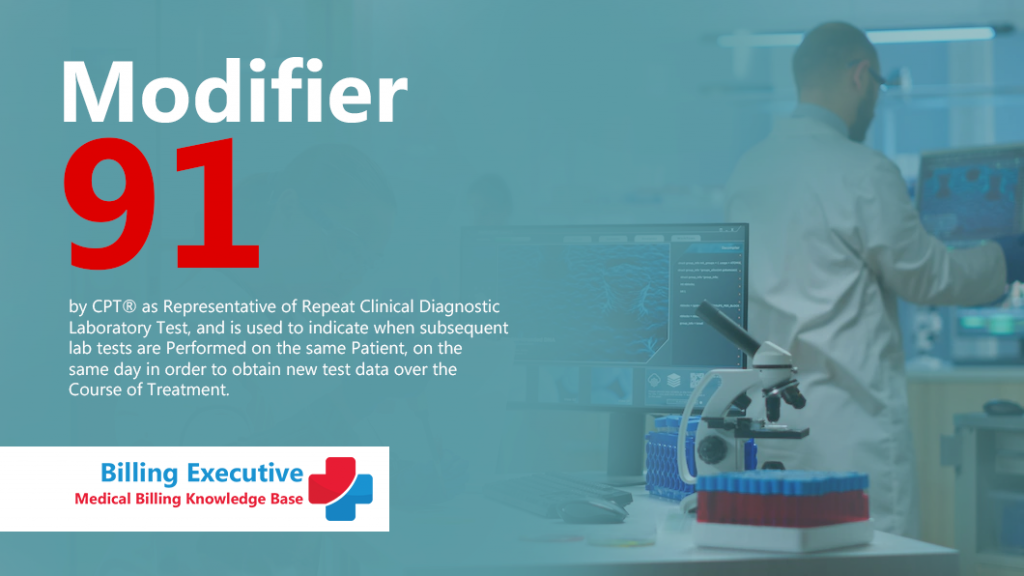MODIFIER 91 Definition
CPT® defines Modifier 91 as a repeat clinical diagnostic laboratory test. It implies when successive lab procedures are conducted on the same patient on the same day to acquire additional test data throughout therapy. You can see why it’s critical to include suitable modifiers when billing the same CPT twice or three times on the same day for the same patient. Consider the claim from the payer’s point of view; it appears to be a copy of services, resulting in an instant denial of these claims.

Why should you use Modifier 91?
Modifier 91 is used to notify repeat laboratory tests or studies conducted on the same patient on the same day. Modifier 91 will only be added if different test results are obtained after the initiation or achievement of the tests performed on the same day.
When to Use Modifier 91
Modifier 91 is used when numerous diagnostic tests must be reported on the same day. For example, if a patient is rushed to the emergency room and a glucose test reveals that the patient is hypoglycemic, the patient is offered glucose gel. Then, fifteen to twenty minutes later, the emergency personnel will need to evaluate him to see if his glucose levels have stabilized.
If this hospital filed a claim that included two glucose tests but no modifier, one of them would be denied. If the hospital filed a claim and one of the glucose tests had a modifier 91, the insurance provider would know that the same test was performed on the same day and was not duplicated. Various tests can be repaid by using modifier 91 in medical billing.
When to Avoid Using Modifier 91
When laboratory studies or experiments are resent due to equipment or sample malfunction or error, modifier 91 is not used. It is also not used when a test is replicated to verify the previous test results.
Furthermore, according to the Modifier 91 description, it should not be noted when the basic procedure code implies that a set of tests will be acquired. CPT codes in the 80047-89398 laboratory code range will be used with Modifier 91. If there are multiple units in a facility, bill them on a single line with the modifier noted and the reference measurements. To summaries:
Modifier 91 should not be used in the following situations:
- When there are issues with the sample during testing.
- If another procedure code explains a series test, use it.
- When a testing procedure is a rerun to verify results.
- When there are issues with the testing equipment.
- If the process code specifies a set of tests.
- When a standard one-time result is needed for any reason.
Instructions and Guidelines
- Irrespective of whether the test is also submitted with HCPCS modifier AY, CPT modifier 91 must be forwarded with offerings that meet that criteria.
- This modifier cannot be used when tests are redone to verify initial results. That is due to sampling or device problems during testing or for any other purpose when a standard, the one-time notifiable result is all that is needed.
- When other codes explain a series of test outcomes, this modifier may not be used (e.g., glucose tolerance tests).
- Suppose a separate service (same CPT code) is instructed for the same patient. In that case, the sample is gathered more than once in a single day. The service is medically needed; clinical lab tests decided ordered by an ESRD facility must be required to submit with CPT modifier 91.
Summary
The 91 modifier has some ambiguities, but a little explanation can go long.
As a general rule for billing modifiers, supporting documentation of the services offered should be kept in the patient’s medical record regardless of individual application. This paperwork will have to do more than demonstrate medical necessity. It must also indicate that the repetitive lab experiments were executed separately and correctly to avoid any questions from the payer.
About us
Billing Executive – a Medical Billing and Coding Knowledge Base for Physicians, Office staff, Medical Billers and Coders, including resources pertaining to HCPCS Codes, CPT Codes, ICD-10 billing codes, Modifiers, POS Codes, Revenue Codes, Billing Errors, Denials and Rejections.
We have more than 10 years experience in US Medical Billing and hand-on experience in Web Management, SEO, Content Marketing & Business Development with Research as a special forte.
Learn More
What patients need to know about balance billing, is balance billing legal?
Medical Necessity Denial and Tips to Avoid it.
Future of Medical Coders with Computer Assisted Coding System
Government Eyes on Hospital Overbilling, HHS suggests targeted reviews
